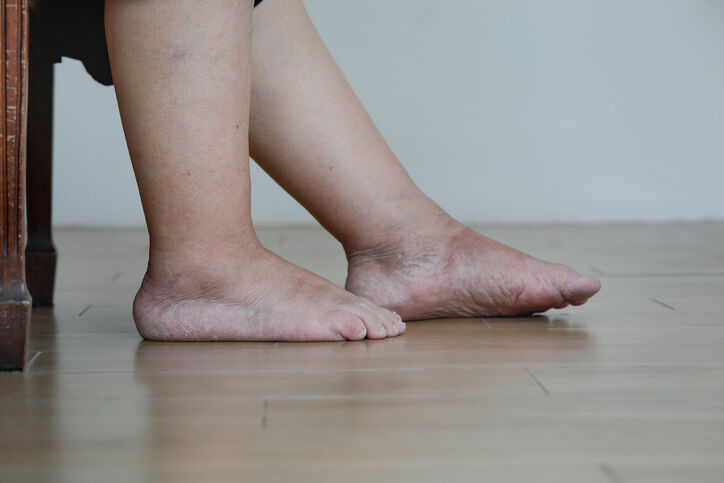
Varicose Veins and Edema: Here's What You Need to Know
Edema, or swelling of the legs and feet, often accompanies varicose veins. Learn why swelling and varicose veins often go hand-in-hand.

Edema affects people of all ages and ranges from mild to severe. Learn more about this common condition, including how to spot it, what to do should you have it, and if you are at risk.
Swelling is an abnormal fluid buildup anywhere in the body, although it most often occurs in the legs, feet, and ankles. The causes of edema (the medical term for swelling) of the feet and ankles have a wide variety of reasons—with some origins being more troubling than others. In some cases, edema resolves on its own. Other times, lower limb swelling can be debilitating and reduce the quality of one’s life.
To help us better understand lower leg edema, we spoke to a vein physician and expert, Abhi Kasinadhuni, MD. Dr. Kasinadhuni (known to his patients as Dr. Kas) specializes in venous and lymphatic medicine and ultrasound-guided interventions. He is the lead physician at Center for Vein Restoration clinics in Wayne, Pennsylvania, and King of Prussia, Pennsylvania.
“Simply put, edema is a fluid accumulation that occurs in the body’s tissues that causes visible or palpable (able to be felt by touching) swelling,” says Dr. Kas.
While edema can occur anywhere in the body, the swelling is most noticeable in the hands, arms, feet, ankles, and legs.
Although the most likely single cause of lower limb edema that occurs on one side in individuals over age 50 is venous (vein) disease, the cause of edema is often multifactorial1 (that is, dependent on several factors).
Dr. Kas outlines the most common symptoms of edema, which include:
In extreme cases of edema, Dr. Kas warns that patients may experience:
Dr. Kas explains that there are many possible reasons for edema to occur. These include:
Venous insufficiency
The most common cause of edema is poorly functioning vein valves in the legs that keep blood from flowing back to the heart, causing blood to pool and pressure to build in the veins.
Dependent edema
Caused in part by sitting or standing for long periods, this condition can be an occupational hazard for hairstylists, teachers, and cashiers, explains Dr. Kas. Raising your legs above your heart can help drain the extra fluid drain back toward your heart, thus reducing swelling.
Mild and temporary water retention
Caused by something as simple as taking in too much salt, this type of edema usually goes away on its own.
An underlying condition that may be more serious
Conditions can include congestive heart failure or chronic lung disease. If this is the case, Dr. Kas recommends treating the serious condition first before a patient undergoes vein treatment.
Chronic health conditions
Venous insufficiency (the medical term for vein disease or incompetent leg veins) and lymphedema (a blockage in the lymphatic drainage system) can cause persistent or long-term swelling.
An allergic reaction
Hypersensitive immune response to certain substances, including medications, foods, contact dermatitis (such as latex), and environmental factors such as mold, pollen, or a bee sting, can cause more severe edema.
Pregnancy
Swelling of the legs, ankles, feet, and fingers, caused by the extra fluid and pressure from the growing fetus, worsens in late pregnancy and resolves spontaneously after delivery.
Low protein levels
Malabsorption of protein from food or highly restrictive diets can cause edema in people with kidney or liver issues.
“Chronic venous insufficiency (CVI) is an extremely common condition. One in two women over the age of 50 years has CVI. One in three men over age 50 has this condition. And it is not just older people who are at risk. One in three women under the age of 50 has this condition.” – Dr. Abhi Kasinadhuni
“Edema can be dangerous,” says Dr. Kas. “In fact, it can be extremely dangerous, possibly fatal, depending on the nature and onset.” For example, Dr. Kas warns that sudden onset of edema accompanied by chest discomfort or difficulty breathing is a reason to seek immediate medical care. These symptoms may result from a DTV (deep vein thrombosis) or PE (pulmonary embolism) blood clot that started in the leg and traveled to the lungs.
Another dangerous cause of edema is anaphylaxis—an allergic reaction that can block the airway. Anaphylaxis is common in children exposed to different foods for the first time who don’t know yet what they may be allergic. Anaphylaxis is seen among adults who take a new medication and do not know they have an allergy to it.
Anasarca, another dangerous form of edema, is the medical term for generalized severe fluid retention that develops over time and can appear everywhere in the body. This fluid can move into the heart and lungs, causing strain, explains Dr. Kas, and can lead to organ system failure.
Dr. Kas strongly recommends that anyone with edema first visit their family physician. He adds that for anyone experiencing leg edema associated with heaviness, achy, pain, or leg fatigue near the end of the day, a qualified venous and lymphatic specialist would be the best professional to diagnose chronic venous insufficiency easily and quickly.
Technology has advanced in recent years, and now many minimally invasive, catheter-based interventions are available to treat vein-related edema. Gone are the days of invasive procedures, such as the outdated vein stripping procedure. Patients can often return to work the same day after today’s modern techniques.
While today’s ingenious, office-based procedures are straightforward, Dr. Kas warns patients to seek care only from vein physicians who perform these procedures all day, every day. At Center for Vein Restoration offices, physicians perform eight to twelve ablations a day, equally thousands of treatments per year. That’s a lot of vein care experience.
“This is the best time in history to have venous edema, or any vein disease treated because the technology has never been better.” – said Dr. Abhi Kasinadhuni
Center for Vein Restoration (CVR) is the country’s clinical leader in vein care. With 100+ centers across the United States, there is sure to be a CVR clinic near you. Most insurances cover procedures, and scheduling with a vein expert is easy. Call 240-965-3915 to speak to a Patient Services Representative or simply schedule online.
1. Dean SM, Valenti E, Hock K, et al. The clinical characteristics of lower extremity lymphedema in 440 patients. J Vasc Surg Venous Lymphat Disord 2020; 8: 851–859. [PubMed]